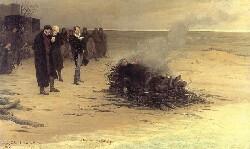 Three white wands had been stuck in the sand to mark the Poet's grave, but as they were at some distance from each other, we had to cut a trench thirty yards in length, in the line of the sticks, to ascertain the exact spot, and it was nearly an hour before we came upon the grave.
Three white wands had been stuck in the sand to mark the Poet's grave, but as they were at some distance from each other, we had to cut a trench thirty yards in length, in the line of the sticks, to ascertain the exact spot, and it was nearly an hour before we came upon the grave.In the mean time Byron and Leigh Hunt arrived in the carriage, attended by soldiers, and the Health Officer as before. The lonely and grand scenery that surrounded us so exactly harmonized with Shelley's genius, that I could imagine his spirit soaring over us. The sea, with the islands of Gorgona, Capraji, and Elba, was before us; old battlemented watch-towers stretched along the coast, backed by the marble-crested Apennines glistening in the sun, picturesque from their diversified outlines, and not a human dwelling was in sight. As I thought of the delight Shelley felt in such scenes of loneliness and grandeur whilst living, I felt we were no better than a herd of wolves or a pack of wild dogs, in tearing out his battered and naked body from the pure yellow sand that lay so lightly over it, to drag him back to the light of day; but the dead have no voice, nor had I power to check the sacrilege -- the work went on silently in the deep and unresisting sand, not a word was spoken, for the Italians have a touch of sentiment, and their feelings are easily excited into sympathy. Even Byron was silent and thoughtful. We were startled and drawn together by a dull hollow sound that followed the blow of the mattock; the iron had struck a skull, and the body was soon uncovered. Lime had been strewn on it; this, or decomposition, had the effect of staining it of a dark and ghastly indigo colour. Byron asked me to preserve the skull for him; but remembering that he had formerly used one as a drinking-cup, I was determined Shelley's should not be so profaned. The limbs did not separate from the trunk, as in the case of Williams's body, so that the corpse was removed entire into the furnace. I had taken the precaution of having more and larger pieces of timber, in consequence of my experience of the day before of the difficulty of consuming a corpse in the open air with our apparatus. After the fire was well-kindled we repeated the ceremony of the previous day; and more wine was poured over Shelley's dead body than he had consumed during his life. This with the oil and salt made the yellow flames glisten and quiver. The heat from the sun and fire was so intense that the atmosphere was tremulous and wavy. The corpse fell open and the heart was laid bare. The frontal bone of the skull, where it had been struck with the mattock, fell off; and, as the back of the head rested on the red-hot bottom bars of the furnace, the brains literally seethed, bubbled, and boiled as in a cauldron, for a very long time.
Byron could not face this scene, he withdrew to the beach and swam off to the 'Bolivar.' Leigh Hunt remained in the carriage. The fire was so fierce as to produce a white heat on the iron, and to reduce its contents to grey ashes. The only portions that were not consumed were some fragments of bones, the jaw, and the skull, but what surprised us all, was that the heart remained entire. In snatching this relic from the fiery furnace, my hand was severely burnt; and had any one seen me do the act I should have been put into quarantine.
After collecting the iron machine in the sea, I collected the human ashes and placed them in a box, which I took aboard the 'Bolivar.' Byron and Hunt retraced their steps to their home, and the officers and soldiers returned to their quarters. I liberally rewarded the men for the admirable manner in which they behaved during the two days they had been with us.
Recollections of the Last Days of Shelley and Byron by E. J. Trelawny. Boston: Ticknor and Fields, 1858. 135-38.
Related items:
- The Percy Bysshe Shelley Page: links to online biography, poetry, prose, essays, correspondence, images and much more;
- Trelawny Recovers Shelley's Body. I told my fears to Hunt, and then went upstairs to Byron. When I told him, his lip quivered, and his voice faltered...;
- Dan Roberts Raises Shelley's Boat. Trelawny receives letters from his friend, Captain Dan Roberts, describing the recovery of Shelley's boat and his theories about how it went down. He also makes an observation or two on Lord Byron;
- The John Keats Page: links to online biography, poetry, prose, essays, correspondence, images and much more;
- Keats Biography in Chamber's Cyclopedia (1863). His passions were always violent, and his sensibility most keen....;
- The Last Letter of John Keats. My dear Brown -- Tis the most difficult thing in the world to me to write a letter....



No comments:
Post a Comment